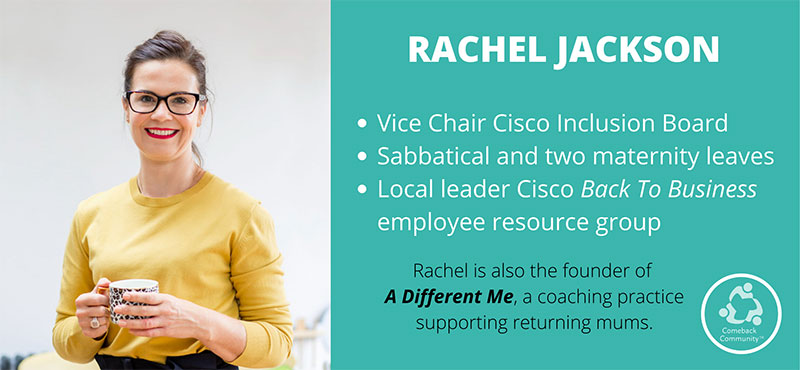Comeback Conversation
Comeback Conversation – How to Get Through the Early Months Back at Work
RACHEL JACKSON knows about surviving the early months back at work after a break. She’s an ex Cisco sales leader, past vice-chair of Cisco’s UK Inclusion & Diversity board and one time UK leader for Cisco’s ‘Back To Business’ employee resource group.
Rachel was Jessica’s guest at our second Comeback Conversation event, answering your questions and tackling your challenges about how to get through the early months back at work.
Rachel was also Jessica’s guest in episode #4 of Comeback Coach where she talked about what would go in her back-to-work Play Book for other professionals returning from a break.
Rachel now runs a coaching business, A Different Me, and is a mum of two under five.
See below for Rachel’s answers to the first three questions we tackled:
- Michelle: I have returned to work 4 days a week (my day off is in the middle), how can I best maintain my work life boundaries so that on my day off with my daughter – I don’t feel the need to do work?
- Alie & Hannah: Alie says “Any tips on returning remotely? My whole company is working remotely.” And Hannah asked from an employer perspective “what can we do to support people returning during Covid?”
- Lisa & Rebecca: Lisa -“How do you make peace with your own ambition v’s where you are right now? (return to work/new situation)” and Rebecca: “It’s clear I would have been promoted into a different structure if I had been here last year but now am the only one on my grade not working for a VP directly…how do I ask for it in the next few months. I have tried but they need to restructure to accommodate.”
I stopped trying to be perfect. I’m a perfectly organised person but I let that façade go at some point.
Rachel’s Back-to-Work Playbook
Don’t know what a playbook is? Jessica laughed with Rachel on the podcast about not knowing when hearing it for the first time from a coachee at PayPal many years ago. In business it’s a set of processes, workflows or procedures on how to get something done. It’s how you’re going to tackle something to succeed.
- Lower your expectations – you don’t need to have the immaculate house/home cooked meals/decorate the bathroom. Certainly, make a list of all those things that do need to happen in the first 6 weeks and then scrub out the things that don’t really need to happen. Taking some of the pressure off is important.
- Think about contingency. Talk to the people around you – friends, colleagues, your other half. And remember, it is not all on you. It is not your job to solve all of those things. You are absolutely part of it but your partner and the people you work with are all a part of making this work too. It’s not all your responsibility.
- Do less at home. Everyone is tired. Take some time out – no need to have a packed weekend.
- Set boundaries. Thinking about what is important to you. But then, communicating those boundaries. We so often set rules in our head but unless we are telling people, it doesn’t become a reality and you don’t follow through. Setting them, communicating them, and sticking to them.
- Ask for help and ask earlier. Don’t get to the point where it all feels too much. Keep checking in with yourself. Think about who can help you/what would help.
WHAT RACHEL STOPPED DOING
- I stopped trying to be perfect. I’m a perfectly organised person but I let that façade go at some point. Pretending that nothing has changed is exhausting and completely unrealistic. In line with that, being more honest with those around you – where you are at and what is going on.
- Stop apologising. Constantly saying sorry in the first few weeks can escalate. Instead thank people for their patience. Change your language: rather than saying sorry, ask how we can make it work.
- Stop being unrealistic as it is not achieving anything, and it is also missing expectations for other people too. Starting to be more honest gives you control and confidence. Accept what is happening and that it is having an impact on how you do your work. Talk to people about it and find new strategies rather than trying to make it look like it’s all working perfectly.
- Stop rushing – when you notice you’re rushing, stop, take a deep breath, and ground yourself.
WHAT RACHEL STARTED DOING
- I started to talk to my manager more. Have weekly check-ins and take control of the conversations. Make sure you talk about priorities. If something is not working, find a way to work together to make it work more effectively.
- Opening up. Being a little bit more honest and letting people work with you and support you makes such a difference.
- If something goes wrong, re-visit your core plan and look for who can help.
- Build up a support group and network.
- Boundaries, boundaries and more boundaries…but really taking time to think what these need to be, and why they are important. For example, defining the what the quality time with your looks like and what you want to do for yourself, e.g. Zoom yoga on Tuesdays. It can feel tough but you need to own them, communicate what these are to other people (partner, manager) and the implications…so they can help you meet them. And stick to them…and if you are finding yourself constantly not following them…think about why?
- Set expectations positively to your team – language is important…”I am fully available on these days” rather than saying when you’re not available. When people have a deadline that may impact on your Wednesday – talk to them about it. Does it really have to be that day- I am fully committed to complete this on Thursday morning…how can we make this work? DON’T APOLOGISE…these are the days that you are paid to work and having this pattern allows you to be more fulfilled/capable/impactful employee.
- Don’t start by doing favours as so difficult to walk it backwards…and you will mis set expectations for “next time”.
- Have a brave and honest conversation with your manager (you can do this- you grew a human). How do you make this an actual 4 day role – what needs to be delegated, does someone in the team want a development opp. You cannot do all that you did before in less time with additional responsibilities – this can take time to recognise and then make changes.
- Being present and committed to your daughter on your day together is so important- it will refresh you for the rest of the week.
- Create a shut down plan/ritual at the end of Tuesday…by 3pm ish recheck your priorities what are the “musts”, what goes on the list for Thursday. What calls to make?
- I think first of all make sure that you still approach the process in the same way as you would if you were travelling to work. You still need the plan, you still need to envisage what might go wrong, talk to your support team, determine how long drop off takes…when can you be available, set boundaries.
- You may only be going upstairs to the spare room – so although not many of us are missing the stress inducing commute…it did serve a very useful purpose…that of enabling a transition. You dropped off and then immediately started on email/making calls whilst on route to the station…we are creatures of habit – so walking to the station, buying your coffee, making calls…this all gave you time to switch from mum to employee and think about the day ahead.
- I am hearing loneliness from lots of working mum coachees – so making sure that you are factoring in time in the working week for virtual coffees, chats on the phone, IM rant…but also to reconnect with your professional network. It is so critical…it is still the most likely way for you to get a role and be recommended.
- Make time to be (brave) and visible…create a video, be on a podcast, write an article on your area of expertise? Choose what works for you
- Focus, follow up deliver and do the hard stuff…
- For HR supporting returning colleagues:
Our advice for HR leaders supporting remote returns
- Support line managers in having timely conversations, before their colleague returns.
- Encourage virtual KIT/SPLIT days if it’s maternity or shared parental leave
- Send flowers, celebrate their return.
- Make an invitation to any virtual induction events you might run for new joiners.
- Call the individual for an informal chat on day one and check in a week later and regularly after that.
- Offer comeback coaching which also includes a line manager behavioural upskill element
- You can absolutely maintain your ambitions and be a mum, they’re not mutually exclusive. You can have it ALL . You just have to be clear on what ALL means to you (not your friend Sarah…but you).
- Excitingly ambition can often be fuelled post baby and creativity rises…women want to make the “most “of the being away time and are just brilliant.
- You are gold dust to your organisation. You have all of your previous talents…then a bundle of new stuff from becoming a mum and you have fresh eyes/perspective. You have been out but also know how to get stuff done.
- But equally I would suggest that giving yourself a little time, and putting ambition on the backburner for a little while is ok too. Time to get into your rhythm (the first 6 week you think you are smashing it and then…kids are ill, your ill, work ramps up etc…)
- You need to re-establish your identity as a working parent…work out what you WANT…coaching, mentoring, manager.
- When you’re ready start building your plan. Get clarity on the what, get all those ideas out, and start getting into action. Do this at your pace….it is your transition, your career, your family…
RACHEL’S TOP TIPS
- Build your support squad. Find that community – it could be NCT mums or a colleague in the office. Find them because you will need them, and they will need you.
- Ask for help. That might be getting a cleaner. Talk to your manager and understand how you can approach it differently. Use resources like investing in a coach. Have someone who is working with you to address these challenges.
- Establishing a good self-care routine. This is the stuff that will get you through the really difficult months. What is it that you need to feed yourself and look after yourself. It may be exercise, reading, listening to a Podcast or having a hot bath. Make sure they are established and you have them to rely on in difficult times.
Recent Comeback Conversations
Our Podcast










